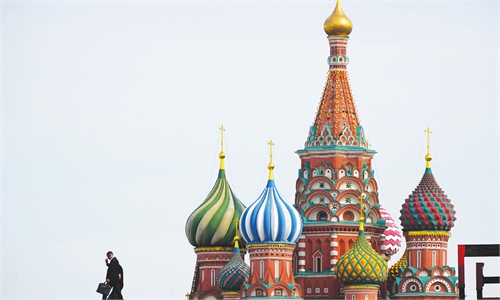
Milking the crisis Illustration: Liu Rui/GT
It was supposed to be a big summer for NATO, welcoming Sweden and Finland at the summit in Vilnius and showcasing the best-of-the-West tanks and other armor in Ukraine's blitzkrieg counteroffensive against Russia. Then reality got in the way.Sweden is still stuck in the waiting room, because Turkey is using NATO's consensus rule as leverage to resolve some lingering issues. Finland was accepted alone, abandoning decades of careful neutrality only to then see half of the tanks it provided Ukraine reportedly become smoldering wrecks practically overnight.
Kiev's "great summer counteroffensive" has so far resembled a big cat safari, with the Leopards faring about as well as the Tigers and the Panthers did in 1943. Germany's foreign minister has already asked the world not to call the tanks "German-made," trying to avoid embarrassment, while the American-made Abrams are still stuck in transit. How fortunate!
As it turns out, winning full scale wars is difficult. So NATO seems to have decided to win an imaginary one instead. On June 12, the US-led military bloc launched a massive display of air power in Europe, dubbed Air Defender 2023. This "largest air force redeployment exercise since NATO was founded," according to the Pentagon, involved around 200 aircraft - half of them American - and has been given a high priority in terms of participation, budgeting and "coordinated strategic communications." In plain English, that means public relations - and they admit it, saying the exercise will "generate a high level of media attention."
Except it hasn't, not yet anyway. Russia shrugged the whole thing off, while the Western media has remained stubbornly glued to the grim news coming from Ukraine, however sanitized by censorship and spin. Maybe that's a good thing. Someone might notice that the other members of the "defensive alliance" can barely scrape as many airplanes together as the one that calls all the shots.
Meanwhile, the North Atlantic alliance is also busily expanding into East Asia, of all places. According to Japanese newspapers - and confirmed by the government in Tokyo - NATO intends to open a liaison office in Tokyo by 2024, to improve ties with Japan, Australia, New Zealand and South Korea.
There used to be a time when the US would pretend that this "security cooperation" was purely defensive in nature. Now Washington is not even trying, while everyone pretty much admits that this is all about confronting China.
In a rare public appearance last month, the head of Britain's military intelligence, Adrian Bird, said that Russia will remain the biggest threat to the UK until 2030, when China will take over. Given how often Washington speaks through London's mouth, it's tempting to conclude that this is the timeline in which the West anticipates a victory over Moscow so it can start a conflict with Beijing. How such a triumph might actually be achieved is an afterthought; they seem to simply assume it shall be so.
Such bluster and bravado is really something to behold, especially since the fighting in Ukraine has exposed a massive weakness of the modern West: the lack of industry. Sure, weapons-manufacturers like Lockheed Martin and Raytheon are currently getting very rich from the war, but mostly by emptying their stockpiles. Actually getting the financialized, de-industrialized economies of the West to produce new weapons, ammunition and equipment - while also trying to switch to "green energy" - to take on the world's two major industrial powers is far easier said than done.
The author is a Serbian-American journalist. opinion@globaltimes.com.cn

